Research shows that there is a significant overlap between functional gastrointestinal disorders (FGIDs), like irritable bowel syndrome (IBS), and eating disorders (ED).
Nearly 50% of individuals with FGIDs have been shown to have disordered eating or a full-blown ED, and some 90%+ of those individuals with a diagnosed ED also have one or more FGIDs.
But which comes first: the gut issues or the food fears and disordered eating? We’ll explore this further in this article.
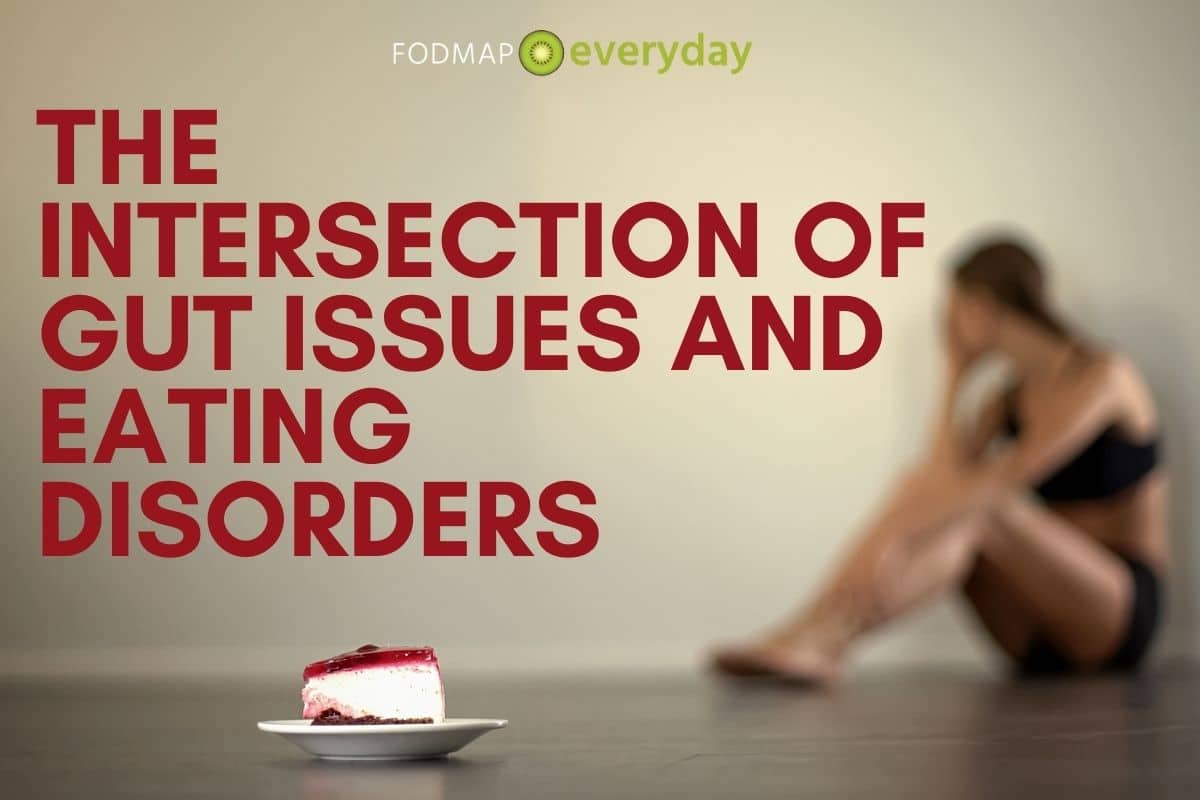
Which Came First? Gut Issues or Disordered Eating?
Longstanding Gut Issues Can Lead to Food Fears
It’s very common for individuals with FGIDs, such as IBS, chronic diarrhea, chronic constipation, or functional dyspepsia to suffer from anxiety around food. After all, if eating feels like navigating a mine field of possible gut triggers, food isn’t always seen as an ally.
This anxiety around food and/or the extended use of elimination diets such as the more strict initial phase of the low FODMAP diet can lead to an increasing narrowing of one’s diet, where more and more foods are eliminated due to real or perceived gut effects. (Note: this is one of the reasons that the low FODMAP diet Elimination Phase is recommended to be strictly limited to 4-6 weeks only).
You May Want To Read: The “Low FODMAP Diet” is NOT Just About The Elimination Phase and The Low FODMAP Diet Elimination Phase: Short & Sweet for Your Health!
As more and more foods are eliminated and overall caloric and nutritional intake do not meet an individual’s daily requirements, changes to the overall brain structure can result. Previously fleeting fears about food can become obsessive and intrusive thoughts, often leading to highly disordered behaviors such as rigid food rules, bingeing and/or purging, further food restriction or avoidance, and more.
In this sort of scenario, the anxiety around food can increase or exacerbate previous gut symptoms, and the limited diversity of food intake can have adverse effects on the gut microbiota, which itself can lead to further gut or other health issues. This can be a very vicious and uncomfortable cycle, and one that is hard to climb out of.
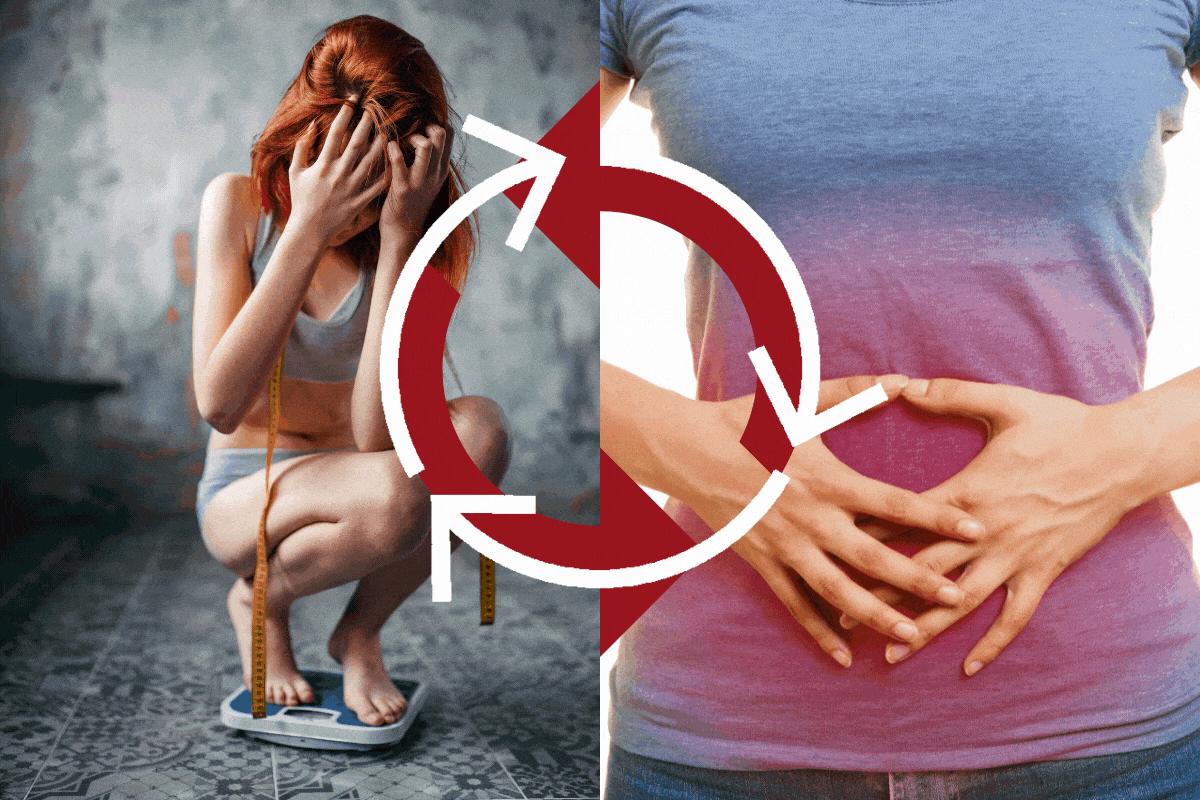
Eating Disorders Can Also Give Rise to Gut Issues
Individuals who suffer from eating disorders such as anorexia nervosa (AN), bulimia nervosa (BN), binge eating disorder (BED) or avoidant/restrictive food intake disorder (ARFID) tend to suffer from myriad psychological symptoms such as anxiety and depression, in addition to disordered eating behaviors and rigid thought patterns.
Here again, we see the effects of anxiety on gut function, whereby during especially high stress periods, individuals with eating disorders may experience significant gut distress in the form of cramping, pain, bloating, diarrhea and/or constipation.
Additionally, certain disordered eating patterns can have a direct and unpleasant effect on digestion and overall gut function. For example, individuals with BN or BED may eat extremely large quantities of food in one sitting, which can stretch the stomach’s capacity and lead to bloating, pain or cramping.
Individuals with BN who frequently purge (via vomiting or chronic laxative abuse) put severe stress on their entire GI tract, which can cause stomach damage or rupture, esophageal damage and/or chronic GERD (gastroesophageal reflux disease), and imbalance of important electrolytes, which can also further exacerbate gut issues.
Finally, those with AN may find that their entire GI tract begins to slow due to lack of food intake, leading to delayed gastric emptying, gastroparesis, and/or constipation, with accompanying symptoms of early satiety, nausea, vomiting and/or bloating.
Unfortunately, these gut symptoms that result from an established eating disorder may lead the individual to further restrict food or limit their dietary variety, thus continuing the cycle.
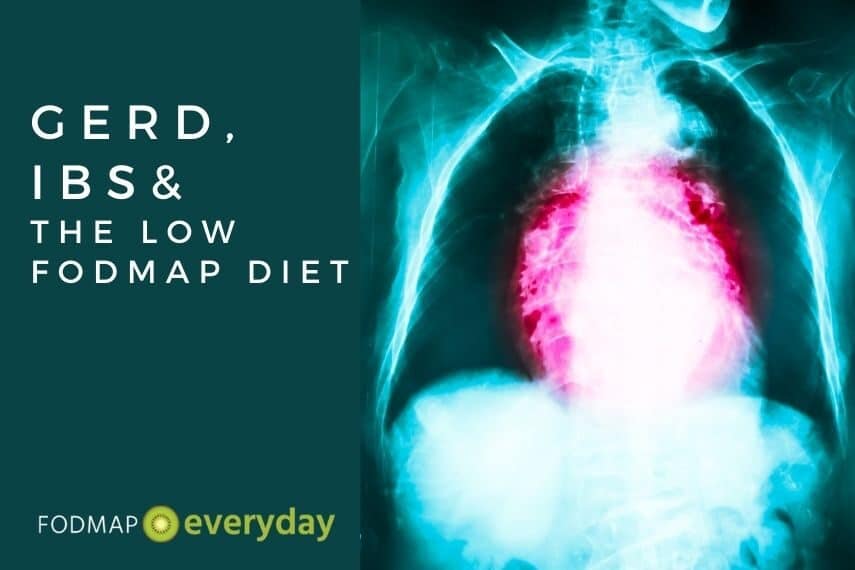
You may want to read: GERD, IBS & The Low FODMAP Diet
Chicken or Egg: Does it Matter?
In reality, which comes first, disordered eating or an FGID, isn’t the most important issue, and science doesn’t give us a clear answer. What remains most important are ensuring a diverse and nutritious diet and getting support for the psychological challenges that can accompany an eating disorder or an FGID.
Whether your gut issues started before or after related food issues, you deserve to be able to eat in a joyful, pleasurable, comfortable, and nutritious way. But how can you begin to move forward?
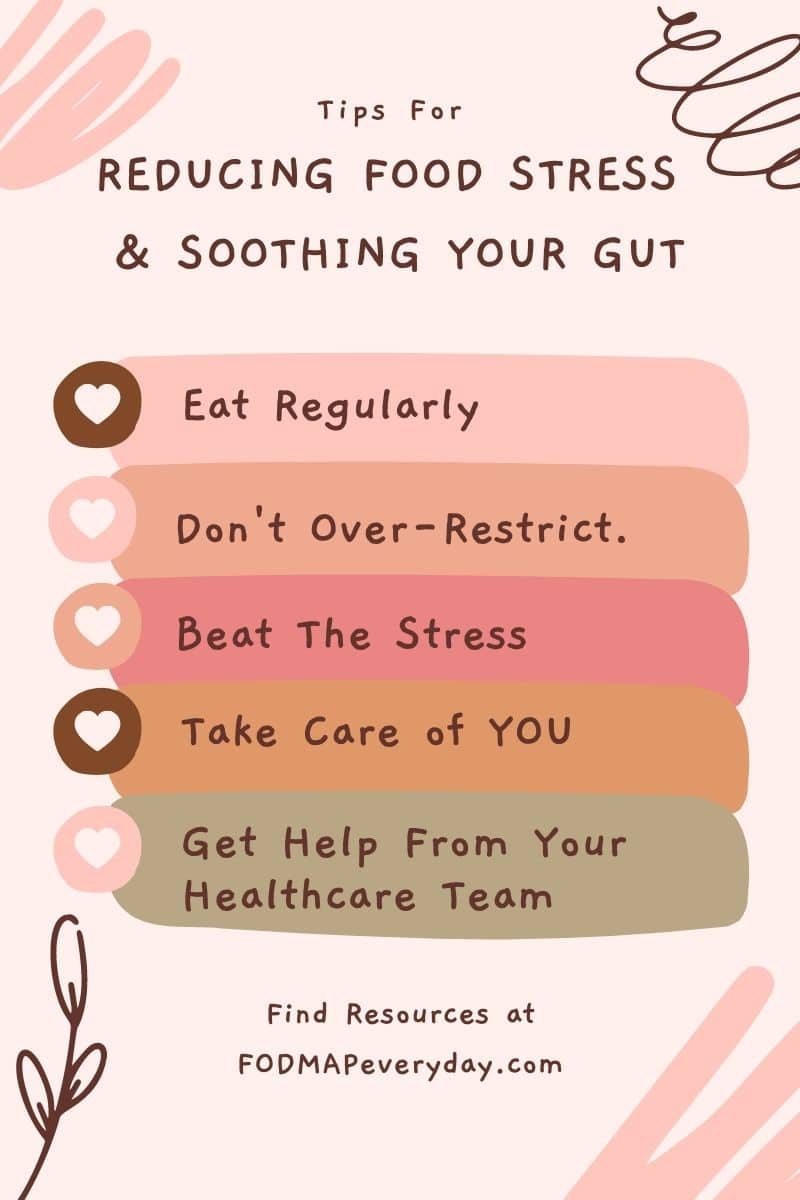
Tips for Reducing Food Stress & Soothing Your Gut
- Eat Regularly. Our guts are designed to have a 3-4 hour “cleaning process,” whereby the gut digests and moves food and waste forward though the GI tract on a systematic basis. If we skip meals or eat too frequently, this disrupts the gut’s normal rhythm and can lead to abnormal motility (diarrhea, constipation, bloating, etc.).
- Don’t Over-Restrict. While the low FODMAP Diet has proven to be effective in reducing gut symptoms from IBS, the Elimination Phase is not intended to be utilized long-term. If you have concerns about disordered eating you may be a better candidate for the “Gentle” Low FODMAP Diet. Similarly, other highly restrictive diets such as the specific carbohydrate diet, Whole30, juice cleanses or other limited food plans can also lead to psychological stress, digestive discomfort, nutritional deficiencies and/or disturbances to gut microbiota. Thus, it’s recommended that you work with a skilled dietitian who can best assess your unique needs, especially if you have any history of disordered eating or restricted intake.
- Beat the Stress. Tools such as gut-directed hypnotherapy, meditation, yoga and regular physical activity can help reduce overall and gut-specific stress. Apps like Nerva from Mindset Health can be very useful to tame a tangled tummy, and there are tons of great videos out there that offer meditation guidance and yoga poses designed to reduce belly discomfort.
- Take Care of You. If you find that you’re generally eating well, but still struggling on occasion with gut issues, try a few of these home remedies and over the counter supplements: Hot water bottle or heating pad for pain and cramping, mint or ginger tea for nausea or upset tummy, magnesium for constipation, soluble fiber or loperamide for diarrhea, peppermint oil capsules for cramping, simethicone for bloating, digestive enzymes for gas and bloating, or general purpose probiotics such as Culturelle or Align (find the best probiotic for you here).
- Get Help. Eating disorders don’t have a “look,” and they don’t discriminate. Anyone can suffer from one at any point in their life. You don’t need to wait until you have lost significant weight or experienced nutrient deficiencies to seek help for disordered eating. If you find you are avoiding long lists of foods, feeling anxious about eating, or you seem to swing back and forth from not eating at all to eating all the things (and then feeling terrible), you might benefit from the support of your healthcare team. (See the References & Resources list below for additional resources as well).
References & Resources:
- Riehl M, Scarlata K. Understanding Disordered Eating Risks in Patients with Gastrointestinal Conditions. J Acad Nutr Diet. 2021. doi:10.1016/j.jand.2021.03.001
- Boyd C, Abraham S, Kellow J. Psychological features are important predictors of functional gastrointestinal disorders in patients with eating disorders. Scand J Gastroenterol 2005;40:929–935
- Gibson D, Watters A, Mehler P. The intersect of gastrointestinal symptoms and malnutrition associated with anorexia nervosa and avoidant/restrictive food intake disorder: Functional or pathophysiologic?—A systematic review. International Journal of Eating Disorders. 2021;54(6):1019-1054. doi:10.1002/eat.23553
- Digestive Disorders and Eating Disorders: A Complicated Mix – Marci R.D. Marci R.D. https://marcird.com/digestive-disorders-eating-disorders-a-complicated-mix/. Published 2021. Accessed November 15, 2021.
- Eating Disorder Hope: https://www.eatingdisorderhope.com/
- National Eating Disorders Association: https://www.nationaleatingdisorders.org/where-do-i-start-0
- ANAD (National Association of Anorexia and Associated Disorders), https://anad.org/
- Eating Disorder Foundation, https://eatingdisorderfoundation.org/about-us/programs/
- Sick Enough, https://www.sickenough.com/
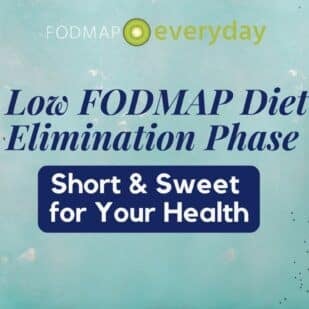







Unfortunately I lost an email on gut issues, and can’t get it back. I think it include disordered eating. I’ve recently been diagnosed with Minimal Change Disease…I am currently eating fairly low Fodmap, haven’t been able to extend my diet much. I have been back to my RD who said I was doing ok.
However that was just before my diagnosis, and I’d like to know if you can recommend further reading or action I could take. (I wanted to ask my Nephrologist on a Telehealth call this am for a renal dietician consult , but didn’t get my request in before the consult finished. )
How to combine low sodium, low fat, etc, etc, with low Fodmap?
With holidays coming up fast most health services are unavailable. Thanks!
Hi Joanne, we do not give individual medical advice. It is not unusual for someone to have multiple issues such as what you have described. Particularly in situations like this we recommend that you do not try to self diagnose and that you figure out the best approach for yourself with your medical team. Perhaps call the nephrologists office and explain that you did have a question that didd not get addressed.